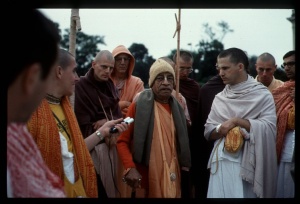CC Madhya 25.130 (1975): Difference between revisions
(Vanibot #0027: CCMirror - Mirror CC's 1996 edition to form a basis for 1975) |
(Vanibot #0020: VersionCompareLinker - added a link to the Version Compare feature) |
||
| Line 2: | Line 2: | ||
<div style="float:left">'''[[Sri Caitanya-caritamrta (1975)|Śrī Caitanya-caritāmṛta (1975)]] - [[CC Madhya (1975)|Madhya-līlā]] - [[CC Madhya 25 (1975)|Chapter 25: How All the Residents of Vārāṇasī Became Vaiṣṇavas]]'''</div> | <div style="float:left">'''[[Sri Caitanya-caritamrta (1975)|Śrī Caitanya-caritāmṛta (1975)]] - [[CC Madhya (1975)|Madhya-līlā]] - [[CC Madhya 25 (1975)|Chapter 25: How All the Residents of Vārāṇasī Became Vaiṣṇavas]]'''</div> | ||
<div style="float:right">[[File:Go-previous.png|link=CC Madhya 25.129 (1975)|Madhya-līlā 25.129]] '''[[CC Madhya 25.129 (1975)|Madhya-līlā 25.129]] - [[CC Madhya 25.131 (1975)|Madhya-līlā 25.131]]''' [[File:Go-next.png|link=CC Madhya 25.131 (1975)|Madhya-līlā 25.131]]</div> | <div style="float:right">[[File:Go-previous.png|link=CC Madhya 25.129 (1975)|Madhya-līlā 25.129]] '''[[CC Madhya 25.129 (1975)|Madhya-līlā 25.129]] - [[CC Madhya 25.131 (1975)|Madhya-līlā 25.131]]''' [[File:Go-next.png|link=CC Madhya 25.131 (1975)|Madhya-līlā 25.131]]</div> | ||
{{CompareVersions|CC|Madhya 25.130|CC 1975|CC 1996}} | |||
{{RandomImage}} | {{RandomImage}} | ||
==== TEXT 130 ==== | ==== TEXT 130 ==== | ||
| Line 11: | Line 10: | ||
<div class="verse"> | <div class="verse"> | ||
:gāyanta uccair amum eva saṁhatāḥ | :gāyanta uccair amum eva saṁhatāḥ | ||
:vicikyur | :vicikyur unmattakavad vanād vanam | ||
:papracchur | :papracchur ākāśavad antaraṁ bahir | ||
:bhūteṣu santaṁ puruṣaṁ vanaspatīn | :bhūteṣu santaṁ puruṣaṁ vanaspatīn | ||
</div> | </div> | ||
| Line 27: | Line 26: | ||
<div class="translation"> | <div class="translation"> | ||
" 'All the gopīs assembled to chant the transcendental qualities of Kṛṣṇa very loudly, and they began to wander from one forest to another like madwomen. They began to inquire about the Lord, who is situated in all living entities internally and externally. Indeed, they even asked all the plants and vegetables about Him, the Supreme Person.' " | |||
</div> | </div> | ||
| Line 34: | Line 33: | ||
<div class="purport"> | <div class="purport"> | ||
This is a quotation from Śrīmad-Bhāgavatam ( | This is a quotation from Śrīmad-Bhāgavatam (10.30.4). The gopīs almost went mad due to Kṛṣṇa's suddenly leaving the rāsa dance. Because the gopīs were fully absorbed in thoughts of Kṛṣṇa, they were imitating His different postures and pastimes. They became very saddened because of His absence, and this incident is explained by Śukadeva Gosvāmī to Mahārāja Parīkṣit. | ||
</div> | </div> | ||
Latest revision as of 16:06, 27 January 2020

A.C. Bhaktivedanta Swami Prabhupada
TEXT 130
- gāyanta uccair amum eva saṁhatāḥ
- vicikyur unmattakavad vanād vanam
- papracchur ākāśavad antaraṁ bahir
- bhūteṣu santaṁ puruṣaṁ vanaspatīn
SYNONYMS
gāyantaḥ—continuously singing; uccaiḥ—very loudly; amum—that one (Lord Śrī Kṛṣṇa); eva—certainly; saṁhatāḥ—being assembled together; vicikyuḥ—searched; unmattaka-vat—like those who have become mad; vanāt—from one forest; vanam—to another forest; papracchuḥ—asked about; ākāśa-vat—like the sky; antaram—within; bahiḥ—outside; bhūteṣu—in all living entities; santam—existing; puruṣam—the Supreme Person; vanaspatīn—all the trees and plants.
TRANSLATION
" 'All the gopīs assembled to chant the transcendental qualities of Kṛṣṇa very loudly, and they began to wander from one forest to another like madwomen. They began to inquire about the Lord, who is situated in all living entities internally and externally. Indeed, they even asked all the plants and vegetables about Him, the Supreme Person.' "
PURPORT
This is a quotation from Śrīmad-Bhāgavatam (10.30.4). The gopīs almost went mad due to Kṛṣṇa's suddenly leaving the rāsa dance. Because the gopīs were fully absorbed in thoughts of Kṛṣṇa, they were imitating His different postures and pastimes. They became very saddened because of His absence, and this incident is explained by Śukadeva Gosvāmī to Mahārāja Parīkṣit.